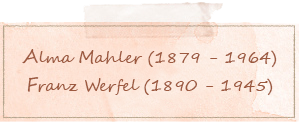
Alma Mahler - at the time Alma Schindler, a young lady of admirable beauty who was dedicated to music and courted by numerous viennese artists including Alban Berg Hugo von Hofmannsthal and Adolf Loos- discovered Venice in 1897, on her first trip to Italy accompanied by her parents and Gustav Klimt (another artist madly in love with her) on the occasion of Arturo Toscanini's concert performance. Only in the summer of 1922 did she return to the city for a lengthy sojourn. She decided to buy a house, situated near the Basilica dei Frari and belonging to the Soranzo family. One day while walking, she met Oscar Kokoschka, a previous lover whose amorous story began after the death of her first husband Gustav Mahler and was abruptly interrupted in 1915 when she married Walter Gropius: I met Kokoschka by chance...he is strangely near and far to me... After Kokoschka's departure, Franz Werfel, a man 11 years her junior, joined her in this romantic city. They meet in 1917 and married in 1929. Venice became for Alma a refuge: I dream of living completely separated from the rest of the world, in my little house in Venice, all alone, protected by the wall of bricks - and to die there. But I do not know still whether I could bear la last great solitude. ...In my house! A little garden, a true paradise. February 1928: I arrived yesterday. Venice! I live in my house. My house built from nothing, a sum of money that never worried me...if I sold it now I would gain a hundred thousand lira, a sum with five zeros. In exchange though, my universe would vanish and I would only have a few zeros more. Alma Mahler and Franz Werfel, though having frequently vacationed in Liguria in the meantime, would leave Vienna for Venice in 1934, leaving behind an Austria in the grips of a nazi turmoil. In this stay in Venice, dreamt for in a long time to forget the fear and anxiety left behind, a new, more personal drama unfolds: Alma's third child, Manon, is affected by polio and would have to return to Austria, where she would die a few weeks later. An irrevocable decision was then taken, one that was entrusted in Alma's diary in July of 1935: We all leave for Venice, with the purpose of selling our dear house, where we were so happy, maybe too much. But the end of this dream was so terrible that we could never find the desire to laugh again.
Alma Mahler, Ma vie, Paris, Hachette, 1985.







